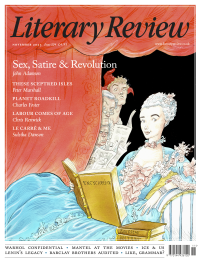Christopher Tyerman
For God & Profit
Templars: The Knights Who Made Britain
By Steve Tibble
Yale University Press 327pp £25
Despite our familiarity with violence legitimised by religion, the medieval crusades continue to perplex modern audiences. Since at least the Enlightenment, the notion of warfare as an act of Christian charity, of physical aggression as an obligation imposed by God, has struck a discordant note. For Christian believers wedded to the idea that their religion prescribes non-violence and turning the other cheek, for rationalists who deplore what they view as the excesses of fanaticism and for materialist sceptics who detect the camouflaging of greed, intolerance and imperialism, the crusades have assumed iconic status as evidence of the strangeness of the past.
Prime suspects in this court of condescension are the Knights of the Temple of Solomon, or Templars. Established by a small group of pious minor French noblemen in the aftermath of the First Crusade’s conquest of Jerusalem in 1099, the Templars acted as a private police force to protect pilgrims arriving from the west. Although laymen, they swore monastic vows of poverty, chastity and obedience. Providing corporate identity, emotional cohesion and legal protection, such religious lay confraternities were not uncommon at the time. Allying monasticism with a military function was, however. Although the western European notion of warfare as an acceptable or necessary means of defence and a way of establishing peace reaches back to the classical world, the Templars offered a new refinement of this. It reflected the emerging justifications for crusading and the militant religious mentalities of the warrior aristocracies of western Europe. The Templar model was soon copied.
Rapidly, the original band of knightly policemen developed into a significant religious institution, providing a standing army central to the defence of the crusaders’ conquests in Palestine and receiving official patronage. This included the grant as their headquarters of the Al-Aqsa Mosque in Jerusalem, which the invaders, eager

Sign Up to our newsletter
Receive free articles, highlights from the archive, news, details of prizes, and much more.@Lit_Review
Follow Literary Review on Twitter
Twitter Feed
Though Jean-Michel Basquiat was a sensation in his lifetime, it was thirty years after his death that one of his pieces fetched a record price of $110.5 million.
Stephen Smith explores the artist's starry afterlife.
Stephen Smith - Paint Fast, Die Young
Stephen Smith: Paint Fast, Die Young - Jean-Michel Basquiat: The Making of an Icon by Doug Woodham
literaryreview.co.uk
15th-century news transmission was a slow business, reliant on horses and ships. As the centuries passed, though, mass newspapers and faster transport sped things up.
John Adamson examines how this evolution changed Europe.
John Adamson - Hold the Front Page
John Adamson: Hold the Front Page - The Great Exchange: Making the News in Early Modern Europe by Joad Raymond Wren
literaryreview.co.uk
"Every page of "Killing the Dead" bursts with fresh insights and deliciously gory details. And, like all the best vampires, it’ll come back to haunt you long after you think you’re done."
✍️My review of John Blair's new book for @Lit_Review
Alexander Lee - Dead Men Walking
Alexander Lee: Dead Men Walking - Killing the Dead: Vampire Epidemics from Mesopotamia to the New World by John Blair
literaryreview.co.uk